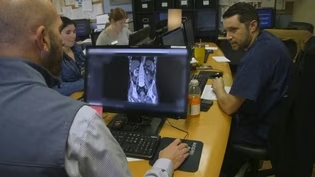
Shutdown disrupts air travel, food assistance for Americans
Clip: 11/8/2025 | 6m 44sVideo has Closed Captions
Longest shutdown on record disrupts air travel and food assistance for Americans
Any possible optimism that lawmakers would reach a deal this weekend to end the longest government shutdown on record has faded. The Senate held its first Saturday session since the shutdown began, but no votes were scheduled. John Yang speaks with former FAA administrator Randy Babbitt and Supreme Court analyst Amy Howe about two widespread effects of the shutdown: air travel and SNAP benefits.
Problems playing video? | Closed Captioning Feedback
Problems playing video? | Closed Captioning Feedback
Major corporate funding for the PBS News Hour is provided by BDO, BNSF, Consumer Cellular, American Cruise Lines, and Raymond James. Funding for the PBS NewsHour Weekend is provided by...

Shutdown disrupts air travel, food assistance for Americans
Clip: 11/8/2025 | 6m 44sVideo has Closed Captions
Any possible optimism that lawmakers would reach a deal this weekend to end the longest government shutdown on record has faded. The Senate held its first Saturday session since the shutdown began, but no votes were scheduled. John Yang speaks with former FAA administrator Randy Babbitt and Supreme Court analyst Amy Howe about two widespread effects of the shutdown: air travel and SNAP benefits.
Problems playing video? | Closed Captioning Feedback
How to Watch PBS News Hour
PBS News Hour is available to stream on pbs.org and the free PBS App, available on iPhone, Apple TV, Android TV, Android smartphones, Amazon Fire TV, Amazon Fire Tablet, Roku, Samsung Smart TV, and Vizio.
Providing Support for PBS.org
Learn Moreabout PBS online sponsorshipJOHN YANG: Good evening, I'm John Yang.
Whatever optimism there may have been that lawmakers would reach a deal this weekend to end the longest government shutdown on record has faded as Senate Democrats demand a one year extension of Affordable Care Act insurance premium subsidies.
President Trump floated an idea of his own terminate per dollar spent the worst health care anywhere in the world, Obamacare.
That's clearly a nonstarter for Democrats.
The Senate held its first Saturday session since the 39-day shutdown began, but no votes were scheduled.
Tonight we're following two of the most widespread effects felt by Americans, air travel and nutrition benefits.
On the second day of reduced flights at 40 airports, the aviation data company Cirium said nearly 4 percent of flights were canceled and about 2 1/2 percent have been canceled for tomorrow.
Randy Babbitt was FAA administrator in the Obama administration.
Mr.
Babbitt, is this working?
Are reduced flights reducing delays?
RANDY BABBITT, Former FAA Administrator: No, they're reducing the flights for the primary purpose and a good purpose of making the system safe.
They're suffering a loss of controllers at the various stations.
They're not interchangeable.
And to ensure the system operates safely, you just have to reduce traffic down to the level of the number of controllers you can put up.
JOHN YANG: Is this sustainable?
RANDY BABBITT: No, it's actually going to continue to accelerate in the wrong direction.
The longer we ask people to work without a paycheck, the longer we ask people to work 10, 12, 14-hour shifts, you just can't sustain that.
People are calling in sick they're tired.
It's an intense job.
The controllers are well trained and there's a lot of stress in that job and you can't keep doing it.
You know, we have the staffing levels where they were for a good reason, and we're not achieving that level of controllers, you know, on site and on their stations.
JOHN YANG: I want to go back to the point you point made about controllers not being interchangeable.
It's not that you can sort of see how many controllers are working nationwide.
It depends on each airport, each air traffic control center.
RANDY BABBITT: Oh, absolutely.
There's a big difference between being an enroute controller or a tower controller or an approach control person.
Those are different jobs and they're not interchangeable.
Someone who's working enroute cannot go the next morning and be in the Richmond tower.
You know, it takes months of training to make those transitions.
JOHN YANG: And controllers, are you talking about how they're sort of being stressed now?
No pay, many of them having to call out to work other jobs to get pay.
They were already stressed even before this began.
The system was already stressed, wasn't it?
RANDY BABBITT: Yes.
We're still recovering post-COVID.
You know, they let, like a lot of companies did, they let people go because the system was only operating at 30 percent at the peak of COVID.
But you don't just call them back.
A lot of them early retired.
And second, if you have to hire them, it takes several years to train a controller to be fully up to speed and be able to go into the different control positions.
JOHN YANG: Former FAA administrator Randy Babbitt, thank you very much.
RANDY BABBITT: Thank you.
Good luck.
JOHN YANG: And now the Supplemental Nutrition Assistance Program, or SNAP, which provides payments to 40 million low income Americans.
Last night, the Supreme Court blocked for the time being a judge's order that the administration pay full SNAP benefits for November.
Amy Howe of SCOTUSblog is PBS News Supreme Court analyst.
Amy so explain, put it simply, what did the Supreme Court do last night?
AMY HOWE, SCOTUSblog: So I'm not sure there's a way to put it simply, but I'll try.
Last night, the Trump administration came to the Supreme Court around 6:45 asking the justices to pause a ruling by a federal judge in Rhode Island that would have required the Trump administration to fully fund the SNAP program for the month of November.
The U.S.
Solicitor General, D. John Sauer, he's the government's top lawyer in the Supreme Court, said, yes, this is a crisis, but it's a crisis that only Congress can fix.
And he asked the justices to act quickly to issue what's known as an administrative stay, to which essentially would put the judge's ruling on hold to give the justices time to rule on the government's request by 9:30 last night.
And the government came to the Supreme Court because it had made a similar request from the U.S.
Court of Appeals for the First Circuit, which is based in Boston and hears appeals from Rhode Island.
And that court, the First Circuit declined to issue the administrative stay, but said, we will act quickly on your request to put the ruling on hold while you appeal.
Shortly before 9:30 at 9:17 last night, Justice Ketanji Brown Jackson issued that administrative stay.
Justice Jackson is what's known as the circuit justice for the First Circuit, which means that all of the emergency requests go initially to her.
And it's not unusual for the circuit justice to issue these kinds of administrative stays.
And she said the reason I'm issuing this stay now is because we expect the First Circuit to act quickly.
And so she put the federal judge's ruling on hold for 48 hours after the first circuit acts.
We don't know exactly when that's going to be, but it could be this weekend, it could be on Monday.
But it means that once the First Circuit does act, then the ruling will only be on hold for 48 more hours.
So this is going to move really quickly, I think.
But the Reader's Digest version of it, so to speak, is that at least for now, the requirement that the government fully fund the November SNAP program is on hold.
JOHN YANG: And this is, as you say, an administrative stay to give the court time.
Does it say anything about the Supreme Court's view of the merits of the arguments on either side?
AMY HOWE: No, it really just says because we expect the First Circuit to act quickly, given the First Circuit's representations that it is going to act quickly.
We're going to go ahead and put this on hold for now.
Things were just moving very, very fast.
And I think it was an effort to give the justices time to decide for the justices to act.
They are certainly these days accustomed to getting requests on their emergency docket, but to try and act that quickly is really a very expedited decision.
JOHN YANG: PBS News Supreme Court analyst Amy Howe, thank you very much, Amy.
AMY HOWE: Thank you.
News Wrap: UPS, FedEx ground MD-11 planes after deadly crash
Video has Closed Captions
Clip: 11/8/2025 | 3m 9s | News Wrap: UPS and FedEx ground MD-11 cargo planes after deadly crash (3m 9s)
Rural U.S. hospitals compete for billions in federal funding
Video has Closed Captions
Clip: 11/8/2025 | 6m 44s | Struggling rural hospitals compete for billions of dollars in federal funding (6m 44s)
What the ‘bird theory’ test may reveal about relationships
Video has Closed Captions
Clip: 11/8/2025 | 6m 50s | What the ‘bird theory’ test may reveal about your relationship (6m 50s)
Providing Support for PBS.org
Learn Moreabout PBS online sponsorship
- News and Public Affairs

FRONTLINE is investigative journalism that questions, explains and changes our world.

- News and Public Affairs

Amanpour and Company features conversations with leaders and decision makers.












Support for PBS provided by:
Major corporate funding for the PBS News Hour is provided by BDO, BNSF, Consumer Cellular, American Cruise Lines, and Raymond James. Funding for the PBS NewsHour Weekend is provided by...


